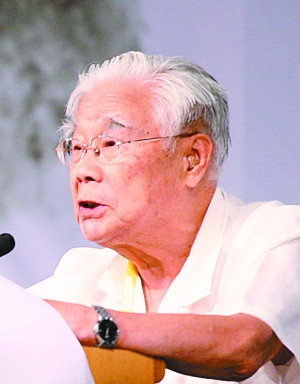Hegel’s ‘absolute spirit’:a warrior conquering all opposites
Author : Source : Chinese Social Sciences Today 2014-01-20

Zhang Shiying
Zhang Shiying joined the Department of Philosophy at Peking University in 1952, serving successively as a lecturer, associate professor, professor and doctoral advisor, as well as director of the academic committee of the Institute of Foreign Philosophy and a member of the university’s academic committee. The chief editor of Complete Works of Hegel (Chinese version), Zhang has authored more than twenty works on theory, including the notable volumes Chinese and Western Cultures and the Ego, Introduction to Philosophy, Mutual Relations between Nature and Humans and On Hegelian Logic.
CSST: People familiar with your works would know that you and your academic career have been closely bound to the Southwest Associated University and Peking University. When did your connection with Peking University begin?
Zhang Shiying: I was born in Wuhan and entered Hankou No. 1 Middle School in 1935. The school’s principal, director of education and most of its teachers had graduated from Peking University so I dreamt of one day going there ever since I was a child. After graduating from high school and awaiting the entrance examination at Chongqing University in the Spring of 1941, I lived in the student dormitories, near the campus of “National Central University” in Chongqing, the auxiliary capital of the Kuomintang government. At that time I was very eager to enroll in the Southwest Associated University in Kunming, which was established by Peking University, Tsinghua University and Nankai University during the war against Japanese invasion. The Southwest Associated University had a very open academic environment and reached a high level of scholarship. At the Southwest Associated University, students’ enthusiasm for politics was as ardent as their interest in academia. When I first came to the university, students had just led the movement “Down with Kong Xiangxi” in response to Kong Xiangxi, the administrative president of the university, bringing a foreign dog with him when flying from Hong Kong to Chongqing, triggering the students’ anger toward the wartime government. Although students joined the demonstration in the daytime when they came back to the university they still studied very hard until midnight.
CSST: The study of Hegel is notoriously difficult, even for seasoned students of philosophy, and yet you dove into Hegel right at the beginning of your studies. Why?
Zhang Shiying: Because I was not satisfied with economics courses I took at the university that was filled with a sense of doing business. I transferred into the Department of Sociology and chose Mr. He Lin’s (1902-1992, a famous Chinese philosopher and translator) introduction of philosophy class, where I first learned about Hegel. What made the deepest impression on me was Mr. He’s explanation of Hegel’s “absolute spirit”, which he called a warrior conquering all opposites. Just as indicated by the old Chinese saying, “A lotus rising unsullied from mud,” a lofty ideal which cannot stand “dirty mud” cannot be counted as a genuinely lofty ideal. This is knowledge of dialectics. Mr. He’s class made me interested in dialectics and provided me with a certain type of theoretical explanation and base.
CSST: Since the 1980s, you have been involved in discussions on “subjectivity”. How does this tie in with your background and interests?
Zhang Shiying: Actually I was not an active participant in the discussion, but I was very much interested in them. I learned that the concept “subjectivity” is explained as something subjective, arbitrary, one-sided and willful. “Subjectivity” is a concept introduced by Western philosophy. It not only brought about my interest in modern “subjective philosophy” since Descartes, but also led me to the post-Hegelian Western modern and contemporary philosophy, for which a defining characteristic is the criticism of “subjective philosophy”. I believe that modern and contemporary ideological trends of humanism in Continental Europe, especially Heidegger’s thought, have much in common with Chinese ancient philosophy, in particular Taoist philosophy. This leads me to pick up various works of ancient Chinese philosophy, especially some of the works of Zhuangzi that I read in my youth.
The Chinese version appeared in Chinese Social Sciences Today, No. 535, Dec. 11, 2013
The Chinese link: http://www.csstoday.net/xueshuzixun/guoneixinwen/86560.html
Translated by Zhang Mengying
Revised by Charles Horne
Ye Shengtao made Chinese fairy tales from a wilderness
Ye Shengtao (1894–1988) created the first collection of fairy tales in the history of Chinese children’s literature...
-
How northern ethnicities integrated into Chinese nation
2023-09-18
-
Mogao caves
2023-09-12
-
Mogao Grottoes as ‘a place of pilgrimage’
2023-09-12
-
Time-honored architectural traditions in China
2023-08-29
-
Disentangling the civilizational evolution of China
2023-08-28
-
AI ethics in science fiction
2023-08-23














 2011-2013 by www.cssn.cn. All Rights Reserved
2011-2013 by www.cssn.cn. All Rights Reserved